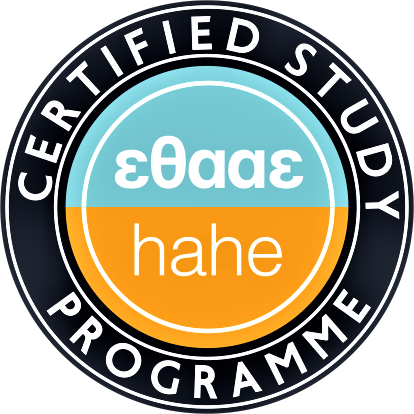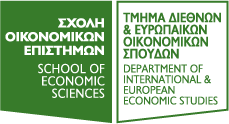Teaching Methods and Examination System
- Lectures
-
Students’ education and training is mainly based on lectures that are held for each course. During the first lecture, instructors generally distribute the course syllabus with information on the topics to be discussed, the reading list to be covered, and the methods for evaluating students’ performance (e.g., mid-term exams, tutorials, written assessments, final exams).
Depending on the nature of the course, the reading list could include a variety of references for students to consult. In the first two years of study, a reading list for a course generally includes textbooks, whereas in the two final years of study it may include articles from scientific journals. In each lecture, instructors are advised to distribute a summary of the main points covered in that lecture.
Although course attendance is not compulsory, the department strongly encourages students to attend lectures in all courses.
- Tutorials
-
During the semester, a series of tutorials are held for certain core economic courses, including Microeconomics and Macroeconomics. Tutorials are optional and they supplement lectures by organising students into smaller discussion groups that further examine topics presented in lectures.
Students who wish to take part in the tutorials of a particular course must apply for them at the beginning of the semester. They are then separated into small discussion groups. Before each tutorial, the instructor of the course distributes a series of questions and problem-solving exercises based on the material taught in lectures. Students work on these questions and exercises for a period of time and prepare an assignment they must submit by a certain deadline. Assignments are collected, graded and returned to students by the assistants who are responsible for coordinating the discussion groups. During tutorials, assistants invite students in their group to discuss their assignments and answers questions and exercises.
The timely submission of assignments and regular participation in tutorial discussions are compulsory for all students who have chosen to take them. Generally speaking, tutorials account for 30% of students’ final mark for the course: 15% is based on students’ performance on assignments and 15% on participation in the discussion. Marks received for tutorials are taken into account only if students achieve a passing grade on the final exams (that is, a grade equal to or greater than 5). This also applies for the September exam period of the same academic year. Grades from tutorials are only valid for exam periods within the same academic year.
One of the main benefits of tutorials is the opportunity students have to collaborate and exchange ideas as to how to solve exercises and prepare their assignments. However, plagiarism is strictly prohibited. If a case of plagiarism is detected, then the General Assembly is called upon to decide on the appropriate punishment.
- Tutoring Sessions
-
Tutoring sessions are offered which supplement lectures in core economic courses such as Microeconomics and Macroeconomics, as well as courses on quantitative methods, such as Mathematics, Statistics, Econometrics, and Accounting. They focus on problem-solving exercises that enhance students’ practical knowledge and skills in these areas. Students have the opportunity to explore issues and discuss ways to approach certain problems and discover their implications on economic outcomes. To encourage participation, a set of problems and exercises is distributed before each session for students to study and prepare. Tutoring sessions are optional; however, students who participate are advised to attend systematically in order to gain a better understanding of analytical techniques and prepare for final exams.
- Mid-term exams – Written assignments
-
Where tutorials and tutoring sessions are not available, students may take mid-term exams or submit written assessments. Mid-terms encourage students to keep up with lectures and help to prepare for final exams. Written assessments give students the opportunity to conduct in-depth research on specialised topics. Students further benefit from the fact that their final mark in the course will not rely exclusively on their performance in final exams; it will also depend on results from mid-terms or written assessments. In some courses participation in mid-term exams is optional. Alternatively, students may have the option of preparing and submitting a written assignment, in collaboration with the course instructor. In most cases the mid-term exam or written assignment accounts for 30% of the final mark for the course, although there could be some variation from course to course. Students who choose neither of these options are assessed totally by their performance in final exams. Marks received for mid-terms or written assignments are also valid for the September exam period of the same academic year. After the academic year ends, they are no longer valid.
- Joint-lectures
-
There are some courses that cover a wider range of topics and disciplines, and are thus more effectively taught with the collaboration of more than one person. Academics who work on various topics and disciplines, and even come from different Greek or foreign universities, are invited to share their knowledge and skills in their area of expertise. With the approval of the General Assembly, one or two of the department’s faculty members undertake the responsibility of organising joint-lectures for a specific course and evaluating students’ performance. They must submit a syllabus with information on the description of the course, the allocation of lectures amongst invited speakers, and the method(s) of evaluating students’ performance (e.g., final exams, tutorials, mid-terms, and written assessments).
- Duration of courses
-
Every academic semester consists of 13 teaching weeks. Classes which do not take place due to instructor illness, holidays, or any other reason are rescheduled following announcement by the Secretariat. According to University regulations, if due to unforeseen circumstances, 12 weeks of teaching are not completed, the semester may be extended following decision by the University administration.
- Final exams
-
Final exams take place at the end of each semester. Performance on final exams determine students’ final mark in the course, after taking into account their performance in tutorials, tutoring sessions, mid-term exams, written assessments and their overall participation in the course. There is an examination period in September during which students may retake exams in classes for which they were registered but did not pass in either of the previous two semesters.
- Course and exam schedules
-
The course and exam schedules are prepared by the department, and are forwarded to the University Administration to be incorporated in the overall course and exam schedule of the university. All announcements regarding changes in the course schedule (lectures, tutorial, tutoring sessions etc) are issued by the department secretary. At the end of each semester, the department Chair informs the General Assembly of the effectiveness of the course schedule and discusses any difficulties that might have emerged during the semester. Faculty members are obliged to submit exam results as soon as possible and no later than 15 days from the day the exam took place. This allows students to decide on the courses they will attend in the following semester, and to collect their textbooks in a timely manner. In special cases, and for specific reasons, the Department Chair can grant a short extension for the submission of exam results.





